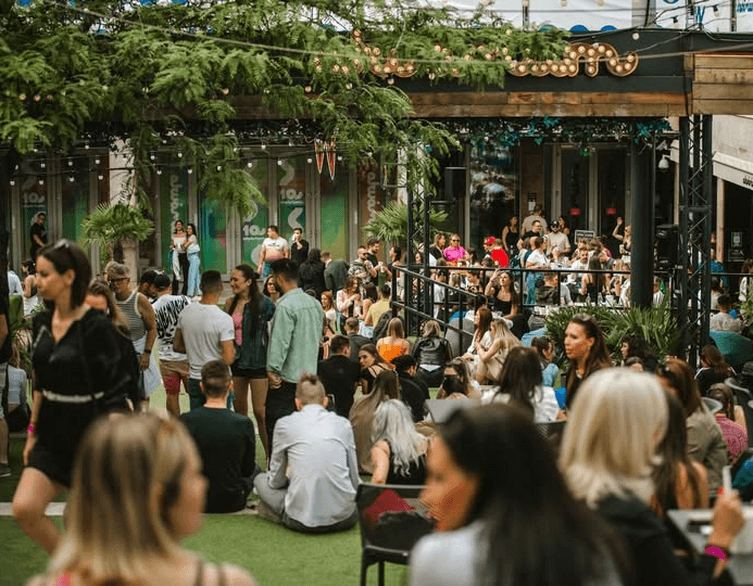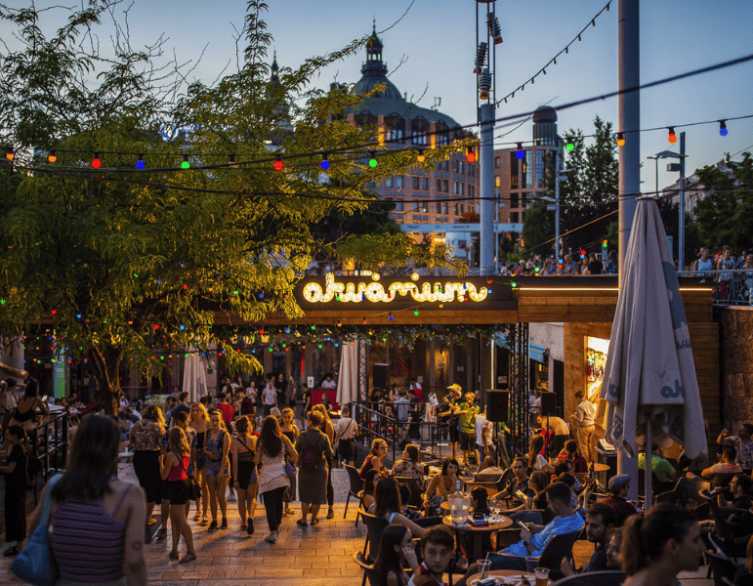Akvárium Klub Stays Open: Budapest’s Underground Music Venue Avoids 2026 Closure

Good news for music lovers planning a Budapest visit: Akvárium Klub, one of the city’s most beloved underground venues, will remain operational throughout 2026 after all. The club’s initial announcement about suspending event planning sparked concerns among both locals and international visitors, but recent developments have resolved the uncertainty surrounding this iconic Erzsébet Square venue.
What Actually Happened
In late September 2025, Hungarian news outlet Telex reported that Akvárium Klub had suspended all event planning for the first half of 2026. The venue cited planned renovation work by the Hungarian National Asset Management Company (MNV), which owns the property, as the reason for halting concert bookings, conferences, and other events. This unexpected announcement sent ripples through Budapest’s cultural scene, leaving many wondering if one of the city’s most authentic nightlife destinations was facing permanent closure.
The situation seemed particularly concerning given the venue’s decade-long presence in the heart of Budapest. Since 2014, Akvárium has operated under a rental agreement with MNV, securing the underground space through a contract running until 2029 with an additional five-year extension option. For a venue with such a solid contractual foundation to suddenly halt operations raised obvious questions about what was really happening behind the scenes.
The Real Story Emerges
Norbert Lobenwein, one of the owners of the company operating Akvárium Klub and organizer of major festivals like VOLT, recently clarified the situation to Hungarian media outlet 444. The reality turns out to be far less dramatic than initially feared. What was reported as a potential venue closure actually involves routine maintenance work and exciting venue developments rather than any existential threat.
According to Lobenwein, the renovation work mentioned in the original reports refers to multiple projects, only one of which directly involves MNV’s maintenance plans. Visitors who have recently walked through Erzsébet Square may have noticed a large tent covering ongoing construction work. These operations involve insulation improvements to certain service units that indirectly connect to Akvárium’s infrastructure. While these maintenance tasks were initially scheduled for early 2026, potentially disrupting the venue’s operations, the timeline has since been adjusted.
Best deals of Budapest
The confusion arose partly because Akvárium’s management received contradictory information about when these larger maintenance projects would reach the club’s actual performance spaces. Faced with scheduling uncertainty and wanting to avoid disappointing artists and ticket holders, the venue’s leadership made the cautious decision to temporarily halt bookings until they could clarify the renovation timeline.
More Than Just Maintenance
The story becomes more interesting when you understand that the MNV maintenance work represents only part of the picture. Akvárium is simultaneously planning its own internal developments to expand its cultural programming beyond its already impressive music lineup. This voluntary evolution involves welcoming new artistic voices that will add theatrical and traditional Hungarian cultural elements to the venue’s offerings.
Three prominent Hungarian artists are joining the Akvárium team: Attila Vidnyánszky Jr., a respected actor-director; István Pál Szalonna, a folk musician; and István Berecz, a dancer. Their involvement signals an intentional broadening of Akvárium’s cultural scope while maintaining the venue’s established reputation for quality music programming. The productions these artists will bring to Erzsébet Square require some technical adaptations, including mobile seating installations and stage equipment modifications.
Lobenwein emphasized that this expansion doesn’t represent a radical transformation of Akvárium’s identity. The venue has already successfully experimented with smaller theater festivals and visual arts exhibitions in recent times, proving the space works well for diverse cultural programming. The addition of theatrical performances and traditional Hungarian cultural productions simply builds on this foundation, offering both locals and visitors a richer array of experiences in the city center.
Everything’s Back on Track
Here’s what matters most for anyone planning a Budapest trip: both the MNV maintenance work and Akvárium’s internal developments have been rescheduled for summer 2026. This means the venue will operate normally throughout the first half of the year, with event planning and bookings fully resumed as of late September 2025. The club will continue showcasing its characteristic mix of concerts, electronic music events, and now potentially theatrical performances without interruption.
The successful rescheduling demonstrates the collaborative relationship between Akvárium’s management and the property owners, despite the initial communication challenges that sparked concern. Visitors can confidently book tickets for events at Akvárium throughout early 2026, knowing the venue will be fully operational during what initially seemed like a potential closure period.
Why This Matters for Budapest Visitors
For international travelers, Akvárium Klub represents something genuinely special in Budapest’s nightlife landscape. Unlike venues specifically designed to cater to tourists, Akvárium maintains an authentically local atmosphere while remaining welcoming to visitors who want to experience Hungarian cultural life beyond the typical sightseeing circuit. Its location beneath Erzsébet Square, right in the city center, makes it accessible to anyone exploring Budapest’s downtown area.
The venue’s programming consistently reflects Budapest’s complex cultural identity, featuring everything from experimental electronic acts to folk fusion bands, indie rock concerts to now theatrical performances. This diversity means visitors can encounter aspects of Hungarian artistic life they might never discover at more tourist-oriented establishments. The underground setting creates an intimate yet electric atmosphere that feels distinctly Budapest, offering that authentic experience so many travelers seek.
The brief uncertainty surrounding Akvárium’s future also highlights broader realities about Budapest’s cultural scene. Independent venues operating in prime locations constantly navigate between preservation and development pressures. While this particular situation resolved favorably, it serves as a reminder that Budapest’s cultural landscape remains dynamic and occasionally unpredictable. For culturally curious visitors, this unpredictability forms part of the city’s charm, even when it occasionally creates confusion.
What to Expect Going Forward
With everything back on schedule, visitors planning Budapest trips for 2026 can look forward to experiencing Akvárium Klub during what promises to be an exciting transitional period. The venue will maintain its established reputation for quality music programming while gradually introducing new theatrical and traditional cultural elements that broaden its appeal.
The additions of Vidnyánszky, Szalonna, and Berecz suggest Akvárium is positioning itself as more than just a music venue. It’s evolving into a comprehensive cultural space that showcases multiple facets of Hungarian artistic expression. For foreign visitors, this means opportunities to experience traditional Hungarian folk music and contemporary theater alongside the electronic and rock concerts that have long defined the venue’s identity.
Anyone visiting Budapest between now and summer 2026 will find Akvárium operating normally, with a full calendar of events spanning its traditional music programming and new cultural offerings. The summer closure for renovations and technical improvements will likely enhance the venue’s capabilities, potentially making post-renovation visits even more impressive.
Budapest’s Cultural Resilience
This entire situation ultimately tells a positive story about Budapest’s cultural ecosystem. When concerns arose about Akvárium’s future, the response from both media and the public demonstrated how much the venue matters to the city’s cultural identity. The quick resolution and transparent communication from Lobenwein show that Budapest’s independent cultural institutions can successfully navigate the challenges of operating in valuable urban real estate.
For visitors who appreciate authentic local culture, Akvárium’s continued operation and expansion represent Budapest’s commitment to maintaining spaces where genuine artistic expression can flourish alongside tourism development. The city’s ability to preserve venues like Akvárium while accommodating necessary infrastructure improvements suggests a mature approach to urban cultural policy.
Whether you’re planning your first Budapest visit or returning for another taste of the city’s vibrant nightlife, Akvárium Klub will be there to welcome you. Check their schedule when planning your trip, and don’t miss the opportunity to experience one of Budapest’s most distinctive cultural spaces. Just remember that if you’re visiting in summer 2026, you’ll need to explore some of Budapest’s other excellent venues instead, as Akvárium will be temporarily closed for those eagerly anticipated improvements that will make it even better for future visits.
Related news
Related events













